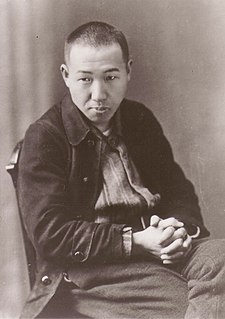A Quote by Hal Borland
There are some things, but not too many, toward which the countryman knows he must be properly respectful if he would avoid pain, sickness and injury. Nature is neither punitive nor solicitous, but she has thorns and fangs as wells as bowers and grassy banks.
Related Quotes
In using the strong hand, as now compelled to do, the government has a difficult duty to perform. At the very best, it will by turns do both too little and too much. It can properly have no motive of revenge, no purpose to punish merely for punishment's sake. While we must, by all available means, prevent the overthrow of the government, we should avoid planting and cultivating too many thorns in the bosom of society.
When the soul is naughted and transformed, then of herself she neither works nor speaks nor wills, nor feels nor hears nor understands; neither has she of herself the feeling of outward or inward, where she may move. And in all things it is God who rules and guides her, without the meditation of any creature.... And she is so full of peace that thought she pressed her flesh, her nerves, her bones, no other thing come forth from them than peace.
I have neither the scholar's melancholy, which is emulation; nor the musician's, which is fantastical; nor the courtier's, which is proud; not the soldier's which is ambitious; nor the lawyer's, which is politic; nor the lady's, which is nice; nor the lover's, which is all these: but it is a melancholy of mine own, compounded of many simples, extracted from many objects, and indeed the sundry contemplation of my travels, which, by often rumination, wraps me in a most humorous sadness.
What I mean by Socialism is a condition of society in which there should be neither rich nor poor, neither master nor master's man, neither idle nor overworked, neither brainslack brain workers, nor heartsick hand workers, in a word, in which all men would be living in equality of condition, and would manage their affairs unwastefully, and with the full consciousness that harm to one would mean harm to all - the realisation at last of the meaning of the word 'commonwealth.'
The establishment of inner harmony is to be attained neither in the past nor in the future, but where the past and future meet, which is the now. When you have attained that point, neither future nor past, neither birth nor death, neither time nor space exist. It is that NOW which is liberation, which is perfect harmony, to which the men of the past and the men of the future must come.
Many of our miseries are merely comparative: we are often made unhappy, not by the presence of any real evil, but by the absence of some fictitious good; of something which is not required by any real want of nature, which has not in itself any power of gratification, and which neither reason nor fancy would have prompted us to wish, did we not see it in the possession of others.
The universal nature has no external space; but the wondrous part of her art is that though she has circumscribed herself, everything which is within her which appears to decay and to grow old and to be useless she changes into herself, and again makes other new things from these very same, so that she requires neither substance from without nor wants a place into which she may cast that which decays. She is content then with her own space, and her own matter, and her own art.
That soul-destroying, meaningless, mechanical, moronic work is an insult to human nature which must necessarily and inevitably produce either escapism or aggression, and that no amount of 'bread and circuses' can compensate for the damage done-these are facts which are neither denied nor acknowledged but are met with an unbreakable conspiracy of silence-because to deny them would be too obviously absurd and to acknowledge them would condemn the central preoccupation of modern society as a crime against humanity.
Some people when they have taken too much and have been driven beyond the point of endurance, simply crumble and give up. There are others, though they are not many, who will for some reason always be unconquerable. You meet them in time of war and also in time of peace. They have an indomitable spirit and nothing, neither pain nor torture nor threat of death, will cause them to give up.


































